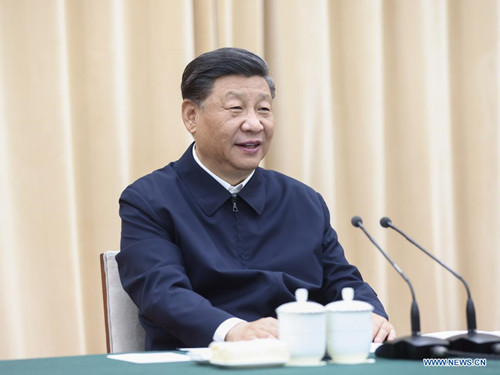Xi sets tone for future of mega water project

President Xi Jinping, also general secretary of the Communist Party of China Central Committee and chairman of the Central Military Commission, convenes a symposium on advancing the high-quality follow-up development of the South-to-North Water Diversion Project, in Nanyang, Central China's Henan province, May 14, 2021. [Photo/Xinhua]
President Xi Jinping set the tone for the future development of China's mega water diversion project at a symposium on Friday, a meeting analysts said will pave the way for the construction of a national network of water resources and stronger water conservation measures in the next five years.
Xi convened the symposium on advancing the follow-up development of the South-to-North Water Diversion Project in Nanyang, Henan province, during which he set out requirements for the next phase of the diversion project.
China must accelerate steps to develop a national network of water resources and improve the nation's capacity to ensure water security across the board in the next five years, said Xi, who is also general secretary of the Communist Party of China Central Committee and chairman of the Central Military Commission.
He highlighted the need for the nation to refine its system of allocating water resources as well as its flood prevention and disaster relief system in different river basins in order to provide a strong guarantee of water security for its modernization drive.
The development of a national water supply network is one of the major infrastructure programs outlined in the nation's 14th Five-Year Plan (2021-25).
Zuo Depeng, an associate professor in the College of Water Resources at Beijing Normal University, said the meeting presided over by Xi charted the course for China's water diversion projects in the next five years.
The meeting could expedite the planning and construction for the next phase of the east and central routes, as well as the western route, which is still in the pre-construction stage, he said.
"Another important policy signal is that there could be stronger water conservation measures in areas that receive the diverted water supply," he said.
Xi has closely followed the progress of the water diversion project in recent years, presiding over meetings to study the issue of water security and issuing a number of important instructions in this regard.
He visited a hydraulic facility in Yangzhou, Jiangsu province, in November, where he stressed the importance of continuing with the project, refining its construction plans and making the eastern route essential to the better allocation of water resources and ensuring water security.
The symposium on Friday was held after Xi traveled to the Danjiangkou Reservoir and surveyed the construction, management and operations of the central route of the project.
The construction of the first phase of the South-to-North Water Diversion Project-which transfers water from the Yangtze River and its tributaries to irrigate arid regions in the north-was started in 2002 for the project's eastern route and in 2003 for its central route.
The central route began supplying water to northern China in 2014, and the eastern route became operational in 2013. So far, they have diverted over 40 billion cubic meters of water to northern China and directly benefited 120 million people.
The central route has now become the pillar of water supply for Beijing, Tianjin and major cities in Hebei and Henan provinces, improving water quality and helping to replenish excessively exploited groundwater, according to the Ministry of Water Resources.
During the symposium, Xi underlined the need for China to get stronger in water resources as the nation enters a new development stage, implement a new development philosophy, foster a new development paradigm, endeavor to establish a national unified market and promote coordinated growth between northern and southern China.
It is important to maximize the comprehensive efficiency of projects, determine the scale and overall distribution of projects based on the long-term demand and supply of water resources and resolutely guard against threats to environmental security, he said.
Xi reiterated the significance of prioritizing water conservation, saying that saving water should be the fundamental solution for areas that receive diverted water supplies. He called for measures to coordinate project investment and efficiency, with stronger measures to compare different plans in order to minimize land acquisition and resettlement.
Zhang Yongqiang, a researcher on hydrology and water resources at the Institute of Geographic Sciences and Natural Resources Research with the Chinese Academy of Sciences, said the South-to-North Water Diversion Project will provide a fundamental solution to the water shortage in North China, especially in areas along the Yellow River.
He noted that there is still immense potential for water conservation in the agricultural sector as irrigation takes up the majority of water use in northern provincial areas, adding that the use of water-saving agriculture technology and adjustments in crop structure could help reduce water wastage.
Zhang said the symposium on Friday could expedite the planning for the long-awaited western route of the mega project, which seeks to divert water from the upper reaches of the Yangtze River to drought-ridden northwestern China.
Wang Guangqian, an academician in the Chinese Academy of Sciences and professor on the regulation of rivers at Tsinghua University, said in an interview in March that the western route, upon its completion, could divert about 40 billion cubic meters of water to the Yellow River to quench the thirst for water in its river basin areas.
The western route, which must traverse high mountains and areas with complex geographical conditions in the Qinghai-Tibet Plateau, could require a total investment of 1.1 trillion yuan ($170.8 billion) over 15 years, he said.
However, the diverted water will help transform the deserts and sandy barren lands in the upper reach of the Yellow River into arable land and unleash the potential for cities along the river to become megacities, he said.
Hou Liqiang contributed to this story.
